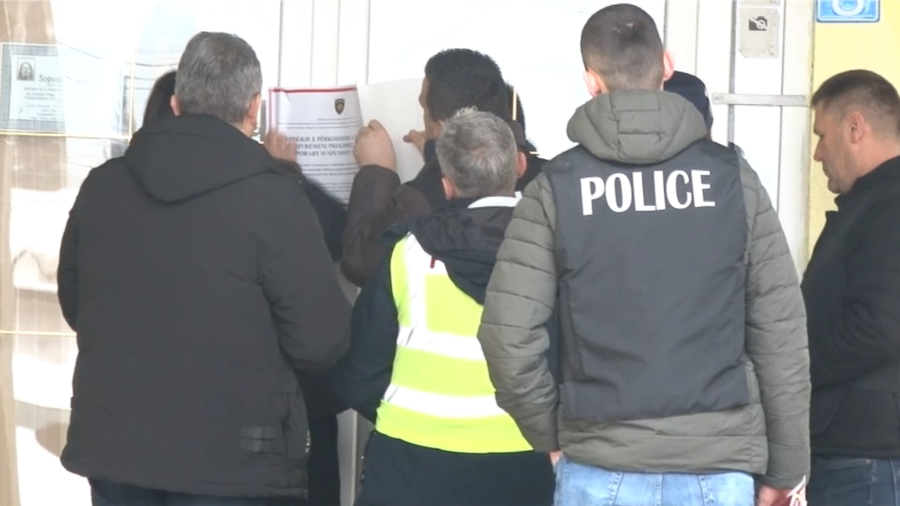
Authorities in Kosovo said on Wednesday that they have closed all parallel Serbian institutions in ten municipalities, a move that angered authorities in Serbia, who canceled their participation in a meeting in Brussels that was expected to discuss the issue of those missing during the Kosovo war.
Officials in Kosovo said that during an operation, Serbia's parallel municipalities in Lipjan, Obiliq, Pristina, Fushë Kosovë, Vushtrri, Novobërdë, Kamenica, Viti, Rahovec, Skenderaj, as well as the parallel post office and tax office, were closed.
Minister of Internal Affairs Xhelal Sveçla said that the chapter of parallel institutions is closed as of today. "In Banja and everywhere in all other parts of the Republic of Kosovo, municipal facilities, post offices, tax offices and all remnants of parallel institutions are ending," he said in a post on social networks.
"These parallel criminal institutions of Serbia have no place in the Republic of Kosovo," said the Minister of Local Government in Kosovo, Elbert Krasniqi.
The Basic Prosecution Office in Pristina said in the afternoon that it has not authorized the Kosovo Police to conduct checks and raids, as it has not received any official request for this matter.
Novak Živić, appointed by Belgrade as the head of the interim authority of the city of Pristina, said that in the presence of international missions today, pressure has been exerted on the Serbian people.
"They have come to catch us, they want to instill fear in us, to expel this people. Today they have come and closed the temporary authority of the city of Pristina. (Albin) Kurti is doing this in the middle of the electoral campaign, to score some political points, just like his followers. This is a great shame for the international community, for the European Union," he said.
The US Embassy in Pristina said that the actions of the Kosovo government to close Serbian-run institutions negatively affect the citizens of Kosovo, Serbs and other communities and may undermine Kosovo's aspirations to join the Euro-Atlantic community.
An embassy spokesperson said in a response to Voice of America that these actions, which go against our best advice, “weaken trust in the relationship and limit our ability to help Kosovo secure a better and brighter future for all its people.”
Belgrade reacted angrily to the closure of parallel institutions.
Serbian Foreign Minister Marko Djuric said that today's coordinated actions by the (Albin) Kurti government mark a dangerous escalation. He wrote on social media that these actions are not just an attack on institutions, but an open attempt to harm the collective rights and identity of Serbs in Kosovo.
He said that these are electoral actions of Albin Kurti, who, according to him, is ignoring human rights by violating agreements that were intended to protect peace and coexistence. He asked the international community not to remain silent.
Serbia's chief negotiator for talks with Kosovo, Petar Petkovic, canceled his participation in the inaugural meeting of the Joint Commission on Missing Persons, due to what he said was the situation on the ground. He said that it is now clear to everyone, including the European Union, that the blame for this lies with Pristina, not Belgrade.
The Serbian official said that with these actions, Kosovo Prime Minister Albin Kurti "is first of all showing that he is not interested in dialogue, nor in the Association of Serbian Municipalities, nor in any Serb living in Kosovo."
The head of the Kosovo government's Commission on Missing Persons, Andin Hoti, said the meeting did not take place due to Serbia's refusal. Mr. Petkovic's presence in Brussels, he wrote on social media, "is the clearest evidence that it was he who orchestrated and guaranteed the failure of the planned meeting, turning a vital technical process into a shameful tool of politicization and obstruction."
Mr. Hoti wrote that Serbia's justification for not participating in the meeting, besides being banal, is also harmful to the process of clarifying the fate of missing persons and has nothing to do with the topic for which they were summoned to Brussels.
Today's meeting was expected to be the first of the Joint Commission on Missing Persons, a month after the chief negotiators of Kosovo and Serbia, Besnik Bislimi and Petar Petkovic, agreed to implement the declaration on missing persons, which was part of the agreement reached in 2023 in Brussels and Ohrid to normalize relations.
In May 2023, the leaders of Kosovo and Serbia signed a joint declaration on persons missing during the war in Kosovo, through which they pledged to "fully implement obligations" to clarify the fate of about 1,600 people about whom nothing is known even nearly 26 years after the end of the war. VOA (A2 Televizion)











